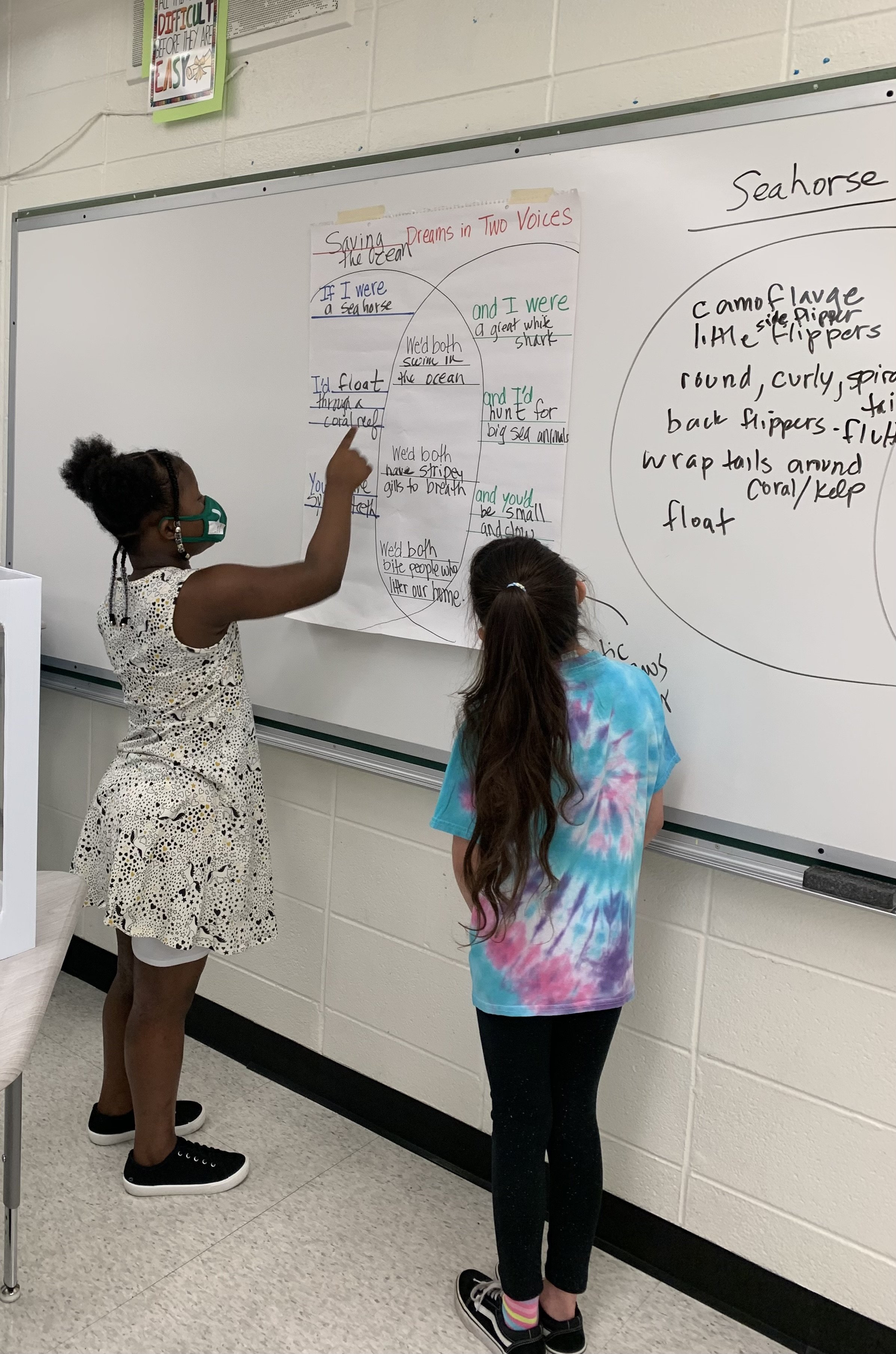Poetry Templates: Training Wheels for All Learners
Fourth grade students create a two-voice poem with the help of a poetry template.
Michelle Schaub writes:
In a recent Diverse Verse blog post, Valerie Bolling heralded poetry for its ability to build a classroom community and include all learners, even those who struggle with more traditional reading and writing activities. As an educator and children’s poet, I wholeheartedly agree. Poetry is concise, yet rich and precise, making it a wonderful tool for educators who are short on time but want to provide students with meaningful reading and writing experiences. More importantly, poetry is accessible to a wide range of learners. This includes struggling readers and writers who fatigue when faced with pages of text, English language learners who need exposure to more challenging vocabulary and sentence structure in small bites, and advanced students ready to dig into the deeper nuances of language.
To make poetry writing even more accessible to students, I, like Valerie Bolling, provide templates for my students. I like to think of templates as poetry training wheels. They provide novice writers with the support to remain upright and on track as they navigate their ideas. With templates, students can focus their energy on developing precise word choice and vivid imagery to make those ideas zoom. In addition to templates for more traditional forms of poetry, like haiku, cinquain, and diamante, I enjoy creating templates to use in conjunction with specific mentor poems.
A poetry collection that is chock full of mentor poems is Dictionary for a Better World: Poems, Quotes, and Anecdotes from A to Z, by Irene Latham and Charles Waters, illustrated by Mehrdokht Amimi. This book provides amazing content to encourage kids to be kind, empathetic change-makers. Each page presents a poem focused on a particular theme, like courage, forgiveness, or listening. Each poem also uses a specific poetry form.
One poem from the book that I enjoy using with students is “Fuel” by Charles Waters. Charles generously gave me permission to share his poem in this post. Thank you, Charles!
FUEL
My journey starts with a full tank on life’s uneven road.
Yet never-ending speed bumps and flat tires take me offtrack,
sputtering along, my fuel burning itself to empty.
I pull over to a rest area, eat, nap, replenish my need to succeed
with some go, go, go before heading back out. Spirit renewed,
I charge ahead until I find my way back—on track, for now.
After reading “Fuel” with students, we discuss the importance of refueling, both physically and emotionally. Students share ways they refuel when their energy burns low. This is where poetry helps build community. In discussing “Fuel” or any poem, students learn about the perspectives and experiences of their classmates, some shared and some different.
Now it’s time to write! I explain that “Fuel” is written as a Cherita. A Cherita is a three-stanza poem that tells a story according to the following format:
The first stanza is one line long. This stanza sets the scene.
The second stanza is two lines long. This stanza describes what happens.
The third stanza is three lines long. This stanza concludes and reflects on the topic.
Then I encourage students to write their own Cheritas that explore how they refuel emotionally and physically. I provide this CHERITA POEM TEMPLATE as a scaffolding for their ideas.
You can find other templates I’ve developed to use with specific mentor poems on my blog Poetry Boost. In addition, you can find a plethora of Poem Share videos, where children’s poets, including many authors from Diverse Verse, share readings of their poems. These make great mentor poems!
Of course, like training wheels, sometimes templates can be put aside. As writers become more confident with using precise language to convey emotions and images, they can experiment with their own formats. With templates as a starting tool, all learners can write poems and experience the joy of seeing their words and ideas soar off the page.
Bio:
Michelle Schaub is an award-winning children’s author. A former language arts teacher, she now enjoys using poetry to inspire and empower kids through author visits and writing workshops. Her books include Fresh-Picked Poetry: A Day at the Farmers’ Market (2017 Cybils Awards Poetry Finalist, 2018 Growing Good Kids Award, and 2019 Northern Lights Book Award); Finding Treasure: A Collection of Collections (2020 NCTE Notable Poetry Book); Dream Big, Little Scientist and Kindness is a Kite String (2022 Illinois Reads selection.) Michelle shares ways to make poetry fun and accessible for young learners at POETRY BOOST, www.poetryboost.com. She also mentors aspiring children’s book writers through her critique service, Rhyme Doctors, at www.rhymedoctors.com. Find out more about Michelle at www.michelleschaub.com.



